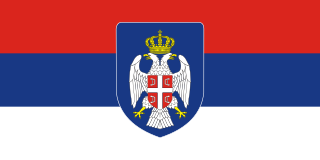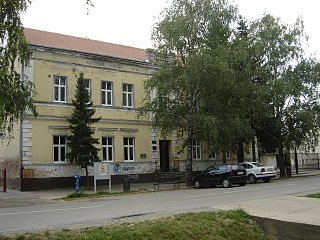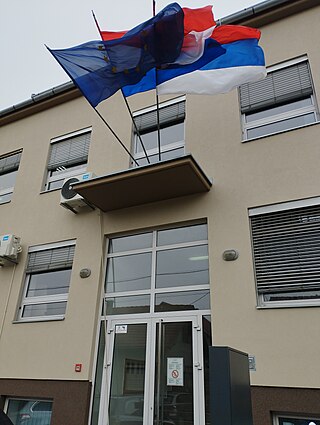
The United Nations Transitional Administration for Eastern Slavonia, Baranja and Western Sirmium (UNTAES) was a UN peacebuilding transitional administration in Eastern Slavonia, Baranja and Western Syrmia, in the eastern parts of Croatia. The transitional administration lasted between 1996 and 1998. The transitional administration was formally established by the United Nations Security Council Resolution 1037 of January 15, 1996. The transitional administration was envisaged and invited in the November 1995 Erdut Agreement between the Croatian Government and the representatives of the local Serb community in the region. At the time of UNTAES deployment the region already hosted another traditional type UN peacekeeping mission known as the UNCRO. While the region was covered under the UNCRO's sector east, the whole UNCRO mission was brought into question by the Operation Storm escalation of hostilities.
The Z-4 Plan was a proposed basis for negotiations to end the Croatian War of Independence with a political settlement. It was drafted by Peter W. Galbraith, Leonid Kerestedjiants and Geert-Hinrich Ahrens on behalf of a mini-Contact Group comprising United Nations envoys and diplomats from the United States, Russia and the European Union. The co-chairs of the International Conference on the Former Yugoslavia, David Owen and Thorvald Stoltenberg, were closely involved in the political process surrounding the plan. The document was prepared in the final months of 1994 and early 1995 before being presented to Croatian President Franjo Tuđman and the leaders of the self-declared Republic of Serbian Krajina (RSK) on 30 January 1995. Tuđman was displeased with the proposal, but accepted it as a basis for further negotiations. However, the RSK authorities even refused to receive the document before UNPROFOR mandate status was resolved. According to later reactions, RSK leadership was not satisfied with the plan.

Mirkovci is a village and suburb of the town of Vinkovci in eastern Croatia. It is geographically within the Syrmia and Podunavlje region. The village is located immediately southeast of Vinkovci separated from the rest of the town by Vinkovci-Gunja railway. At the time of 2011 Census, the local population was 3,283.

Eastern Slavonia, Baranja and Western Syrmia, commonly abbreviated as Eastern Slavonia, was a short-lived Serb parallel entity in the territory of Croatia along the Danube river.

United Nations Security Council resolution 1023, adopted unanimously on 22 November 1995, after recalling all resolutions on the conflicts in the former Yugoslavia, the Council noted the "Basic Agreement on the Region of Eastern Slavonia, Baranja and Western Sirmium" between the Government of Croatia and local Serb representatives.

United Nations Security Council resolution 1025, adopted unanimously on 30 November 1995, after recalling resolutions 981 (1995) and 1023 (1995) on Croatia, the Council decided that the mandate of the United Nations Confidence Restoration Operation (UNCRO) would terminate after an interim period ending 15 January 1996.

United Nations Security Council resolution 1031, adopted unanimously on 15 December 1995, after recalling all previous resolutions on the conflicts in the former Yugoslavia, the council, acting under Chapter VII of the United Nations Charter, discussed the transfer of authority from the United Nations Protection Force (UNPROFOR) to the multinational Implementation Force (IFOR).

United Nations Security Council resolution 1037, adopted unanimously on 15 January 1996, after recalling previous resolutions on Croatia including resolutions 1023 (1995) and 1025 (1995), the council established the United Nations Transitional Authority for Eastern Slavonia, Baranja and Western Syrmia (UNTAES) for an initial period of 12 months.

United Nations Security Council resolution 1038, adopted unanimously on 15 January 1996, after recalling previous resolutions on Croatia including resolutions 779 (1992), 981 (1995) and 1025 (1995), the Council authorised the United Nations Mission of Observers in Prevlaka to continue monitoring the demilitarisation in the Prevlaka peninsula area of Croatia.

United Nations Security Council resolution 1043, adopted unanimously on 31 January 1996, after recalling previous resolutions on Croatia including Resolution 1037 (1996) which established the United Nations Transitional Authority for Eastern Slavonia, Baranja and Western Sirmium (UNTAES), the Council authorised the deployment of 100 military observers for an initial period of six months. On 26 January the Secretary General informed the Security Council that the UNTAES mission will need the observers to supervise demilitarization of Eastern Slavonia.

United Nations Security Council resolution 1069, adopted unanimously on 30 July 1996, after recalling previous resolutions on Croatia including Resolution 1037 (1996) which established the United Nations Transitional Authority for Eastern Slavonia, Baranja and Western Sirmium (UNTAES) and Resolution 1043 (1996) authorising the deployment of military observers, the Council extended the deployment of 100 military observers with UNTAES for a further six months until 15 January 1997.

United Nations Security Council resolution 1119, adopted unanimously on 14 July 1997, after recalling previous resolutions on Croatia including resolutions 779 (1992), 981 (1995), 1025 (1995), 1038 (1996), 1066 (1996) and 1093 (1997), the Council authorised the United Nations Mission of Observers in Prevlaka (UNMOP) to continue monitoring the demilitarisation in the Prevlaka peninsula area of Croatia until 15 January 1998.

United Nations Security Council resolution 1120, adopted unanimously on 14 July 1997, after recalling previous resolutions on Croatia including 1023 (1995), 1025 (1995), 1037 (1996), 1043 (1996), 1069 (1996) and 1079 (1996), the Council extended the mandate of the United Nations Transitional Authority for Eastern Slavonia, Baranja and Western Sirmium (UNTAES) until 15 January 1998.
United Nations Security Council resolution 1145, adopted unanimously on 19 December 1997, after noting the termination of the mandate of the United Nations Transitional Authority for Eastern Slavonia, Baranja and Western Sirmium on 15 January 1998 in accordance with Resolution 1120 (1997), the Council authorised a support group of 180 civilian police monitors, known as the United Nations Civilian Police Support Group (UNPSG), to observe the situation in eastern Croatia for an additional nine months.

The Erdut Agreement, officially the Basic Agreement on the Region of Eastern Slavonia, Baranja and Western Sirmium, is an agreement reached on 12 November 1995 between the authorities of the Republic of Croatia and the local Serb authorities of the Eastern Slavonia, Baranja and Western Syrmia region on the peaceful resolution to the Croatian War of Independence in eastern Croatia. It effectively ended the ethno-nationalist conflict in the region and initiated the process of peaceful reintegration of the region to central government control of Croatia. The reintegration was directly implemented by the United Nations. The agreement provided a set of guarantees on human and minority rights as well as on the refugee return. It was named after Erdut, the village in which it was signed by local Serb representatives.

Tenja is a village in eastern Slavonia, Croatia, located just southeast of Osijek. The population is 7,376.

The Joint Council of Municipalities in Croatia is an elected consultative sui generis body which constitutes a form of cultural self-government of Serbs in the eastern Croatian Podunavlje region. The body was established in the initial aftermath of the Croatian War of Independence as a part of the international community's efforts to peacefully settle the conflict in self-proclaimed Eastern Slavonia, Baranya and Western Syrmia. The establishment of the ZVO was one of the explicit provisions of the Erdut Agreement which called upon the United Nations to establish its UNTAES transitional administration.

The United Nations Civilian Police Support Group (UNPSG) was a United Nations peacekeeping operation monitoring the performance of the Croatian police in the Danube region from 16 January 1998 to 15 October 1998. The mission was active in the same area of the former parallel Eastern Slavonia, Baranja and Western Syrmia which was previously directly governed by the UNTAES transitional administration between 1996 and 1998. The mission took over vehicles, equipment and other support assets from UNTAES. UNPSG was not the first CIVPOL engagement in the region as earlier missions of UNPROFOR, UNCRO and UNTAES all included civilian police components.

1997 Eastern Slavonia integrity referendum was held on 6 April in short-lived Serb parallel entity of Eastern Slavonia, Baranja and Western Syrmia which at the time was already governed by the United Nations Transitional Administration for Eastern Slavonia, Baranja and Western Sirmium (UNTAES) as an UN governed territory. Voters were asked whether they supported the proposal for the region of Eastern Slavonia to remain a single territorial oblast within Croatia after the end of UNTAES mandate instead of division into Vukovar-Syrmia and Osijek-Baranja County. Reportedly 99.01% or 99.5% of voters voted for the integrity of the region within Croatia. 77,40% out of 100.275 registered voters participated in the referendum.

The Operation Vukovar '95, more known as the Vukovar dove was a planned military-police operation of the Croatian Army in early November 1995 and in mid 1996. The operation was intended to militarily liberate the last remaining occupied part of Croatia after Operation Storm, including the region of Eastern Slavonia. The operation was abandoned due to intervention of UN peacekeepers and the signing of the Erdut Agreement.










